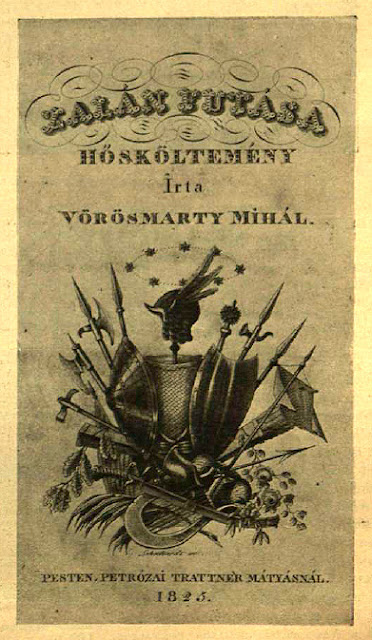The writer of the second Hungarian National Anthem, Mihály Vörösmarty was born in a poor family. From an early age, political activism and resulting patriotism became the basis of his writings. In his youth, the impact of unrequited love from a certain lady, Etelka Perczel, was also in many of his poems.
Today he is still nationally popular as a Hungarian poet and translator.
In 1825 he published an epic poem, Zalán futása (The Flight of Zalán), describing the conquest of Hungary by Árpád. The epic has great artistic merit, and the ongoing patriotic upsurge of the period together made Vörösmarty and his work famous. The public clamoured for more work describing the glorious past of the Hungarian nation.
For nineteenth century Hungarians, Zalán futása derived its significance from an insistent tone that ran throughout its descriptions of battle scenes, war councils, and military preparations. Vörösmarty urged his generation of “indolent, soft, and lethargic” Hungarians to emulate Árpád and his heroic warriors. The epic is not, however, a call to arms, but rather a summons to patriotism. Indeed, what makes it enjoyable reading today is that its message, although outdated, is expressed not in strident, ethnocentric proclamations, but in a personal, elegiac voice, gently chiding rather than criticising the weak descendants of mighty forefathers. ( source Hungarian literary archive )
Alpár looks around on his far-reaching plane
The princely Zalán. As well as the Estate of the yellow death,
so sad and silent now, and its former
splendor is declining, replaced by low mourning.
He stood proudly before: powerful to his enemy,
offering favor to his neighbor who came with a pious heart:
Unceasing from the sound of the freeman's joy.
Now his deep silence is broken by lamentation and his voice of woe,
And on the empty hall sway with languid steps
Terrified ladies, heartless men, and mutilated braves wounded from the
perils of battle;
Or with rattling maces in triumphal joy
The rushing Hungarians come to bring news from their lords, from Árpád the Panther: how the terrible Tuhutum
fought with the cowardly Gelo , how was his battle in Nyirség.
splendor is declining, replaced by low mourning.
He stood proudly before: powerful to his enemy,
offering favor to his neighbor who came with a pious heart:
Unceasing from the sound of the freeman's joy.
Now his deep silence is broken by lamentation and his voice of woe,
And on the empty hall sway with languid steps
Terrified ladies, heartless men, and mutilated braves wounded from the
perils of battle;
Or with rattling maces in triumphal joy
The rushing Hungarians come to bring news from their lords, from Árpád the Panther: how the terrible Tuhutum
fought with the cowardly Gelo , how was his battle in Nyirség.





No comments:
Post a Comment